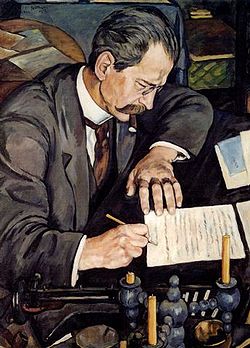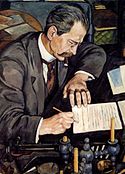Arno Holz
| Arno Holz | |
 Arno Holz, 1913. | |
| Född | 26 april 1863[1][2][3] Kętrzyn[4] |
|---|---|
| Död | 26 oktober 1929[5][1][2] (66 år) Berlin[5] |
| Begravd | Friedhof Heerstraße[6] |
| Medborgare i | Tyskland |
| Sysselsättning | Poet[7], dramatiker[7], författare[7], journalist |
| Utmärkelser | |
| Schillerpriset (1885) | |
| Namnteckning | |
 | |
| Redigera Wikidata | |

Arno Holz, född 26 april 1863 i Rastenburg, Ostpreussen, död 26 oktober 1929 i Berlin, tysk författare och litteraturteoretiker.
Holz började som lyriker i traditionell stil men sökte sig uttryck i Das Buch der Zeit. Lieder eines Modernen (1885). I förening med Johannes Schlaf slog han sig in på en "konsekvent realism", som han teoretiskt utvecklade i Die Kunst, inhr Wesen und ihre Gesetze (2 band, 1890-92). Tillsammans med Schlaf skrev han berättelserna Papa Hamlet (1889) och dramat Die Familie Selicke (1890). Holz lyriska genombrott betecknas av Phantasus (1898-99, omarbetad 1925), dikter på fri vers. Förutom dessa verk brukar barockpasticherna Lieder auf einer alten Laute (1903) räknas till hans främsta verk. Bland Holz brader märks tragikomedin Traumulus (1905, skriven tillsammans med Oskar Jerschke), Sonnenfinsternis (1908) och Ignorabimus (1913). en samlad upplaga av Holz samlade skrifter, Das Werk, utkom i 10 band 1924-26.
Källor
- Carlquist, Gunnar (red.) (1932). Svensk uppslagsbok. Malmö: Svensk Uppslagsbok AB:s förlag, band 13 s. 256.
Noter
- ^ [a b] Bibliothèque nationale de France, BnF Catalogue général : öppen dataplattform, läs online, läst: 10 oktober 2015, licens: öppen licens.[källa från Wikidata]
- ^ [a b] SNAC, Arno Holz, läs online, läst: 9 oktober 2017.[källa från Wikidata]
- ^ International Music Score Library Project, Arno Holz, läst: 9 oktober 2017, licens: Erkännande-DelaLika 4.0 Internationell.[källa från Wikidata]
- ^ Gemeinsame Normdatei, läst: 10 december 2014, licens: CC0.[källa från Wikidata]
- ^ [a b] Aleksandr M. Prochorov (red.), ”Хольц Арно”, Большая советская энциклопедия : [в 30 т.], tredje utgåvan, Stora ryska encyklopedin, 1969, läst: 28 september 2015.[källa från Wikidata]
- ^ läs online, www.berlin.de , läst: 20 april 2022.[källa från Wikidata]
- ^ [a b c] Archive of Fine Arts, läs online, läst: 1 april 2021.[källa från Wikidata]
Externa länkar
 Wikimedia Commons har media som rör Arno Holz.
Wikimedia Commons har media som rör Arno Holz.
Media som används på denna webbplats
Signature of Arno Holz
Författare/Upphovsman: Internet Archive Book Images, Licens: No restrictions
Identifier: germanclassicsof18fran (find matches)
Title: The German classics of the nineteenth and twentieth centuries; masterpieces of German literature
Year: 1913 (1910s)
Authors: Francke, Kuno, 1855-1930 Howard, William Guild, b. 1868 Singer, Isidore, 1859-1939
Subjects: German literature German literature English literature
Publisher: Albany, N. Y. : J. B. Lyon company
Contributing Library: University of California Libraries
Digitizing Sponsor: Internet Archive
View Book Page: Book Viewer
About This Book: Catalog Entry
View All Images: All Images From Book
Click here to view book online to see this illustration in context in a browseable online version of this book.
Text Appearing Before Image:
N the woods is a village smallLying in the sunshines gold,By the hill-side house, the last of all,Sits a woman old, so old. She sits and spins no more,Her thread slips to her feet.She thinks on the days of yoreAnd sinks into slumber sweet. Noon-day steals with quiet deepOer the glimmering green, and nowEven thrush and cricket sleepAnd the steer before the plough. All at once theyre marching by,Gleaming the woods along,Ahead of the soldiers flyDrum-beats and fifes gay song. And to the song of Bliicher brave,** Theyre here! cries the village gay,And all the little maidens waveAnd the boys cry out: Hurrah! God bless the harvest gold.And all the wide world too.The Emperors soldiers boldThe fields are marching through! • Translator: Margarete Munaterberg.(308)
Text Appearing After Image:
ARNO HOLZ ARNO HOLZ: POEMS 309 Turning round by the hill-side near,Where the last house seems to smile,See, the first in the woods disappear,And the old woman wakes meanwhile. So heavy her heart is growing In deepest reverie, Her tears are flowing, flowing:** Like one of these was he. OTTO JULIUS BIERBAUM (1865- ) ENOUGH*
Note About Images


